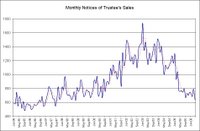Abramoff's visits to the White House
The documents can be found here (PDF).
UPDATE (May 17, 2006): These logs are the only ones the U.S. Secret Service has--the logs that are needed for a complete record are in the possession of the White House.
Posted by
Lippard
at
5/10/2006 05:14:00 PM
0
comments
![]()
Posted by
Lippard
at
5/08/2006 06:24:00 AM
0
comments
![]()
Labels: law, net neutrality, politics, spam, technology
Lie #1: McCurry knows the Internet is not "absent regulation" yet he's willing to deceive the public if it helps his clients. As Matt Stoller points out on MyDD:
What McCurry did not tell the public was that during the Clinton years, the FCC actively enforced net neutrality -- the Internet's First Amendment -- against his telecom clients. Common carrier statutes have in fact been a bedrock principle of telecommunications law since 1934, and in 1996 Congress ratified that with a commitment to network neutrality.
Mike McCurry has a moral obligation to everyone who has ever respected him and looked up to him to answer this question: Do you stand by your statement that the Internet is "absent regulation?" Or do you admit that, like so many parts of our American economy, the Internet does have rules?
This is deceptive--ISPs are not common carriers and Internet services offered by telecoms are not bound by common carriage regulations. Internet services have been classified as information services or enhanced services, and thus don't have to collect fees for universal service or take anyone who comes along as customers. Common carrier means you have to accept everyone as a customer and not discriminate about what traffic that is carried (so long as it's legal), but ISPs can, do, and should set standards beyond what the law requires in order to (for example) keep spammers off their networks. Common carrier status has only an indirect relationship to the Internet and net neutrality--it is about physical interconnection, not about Internet interconnection.
Stoller goes on to describe the FCC regulatory change regarding DSL networks:
Yet less than a year ago, in August, 2005, the Clinton -Gingrich policy of enforced network neutrality was radically upended by the FCC:
The FCC said that phone companies such as Verizon, SBC, BellSouth, Qwest and other local telcos will no longer be regulated by traditional telephone rules when it comes to their DSL broadband services. The FCC agreed unanimously to classify DSL broadband as an "information service" rather than a telephone service. Phone companies will no longer be required open their broadband networks to access by third-party ISPs.After a one-year transition period, the phone companies can arbitrarily end any agreements they were forced to make with independent ISPs. During the transition year, the ISPs can attempt to negotiate new deals, but the cards are all in the hands of the telcos.
In other words, you know all that nice Clinton-Gingrich policy that made the internet work? Yeah, after a one year transition period, that's gone, as a sort of sunset provision for the free internet sets. This is incredibly sneaky. What McCurry is doing is couching a radical change to the internet in the guise of the status quo.
Stoller makes it sound like this change has something to do with RBOCs' Internet services, but it doesn't. It has to do with other ISPs using RBOCs' last-mile networks to connect consumers to their own Internet services--those ISPs typically don't connect to the RBOCs' Internet services, but rather purchase IP transit from multiple backbone providers.
Contrary to Stoller and Green, there was no "Clinton-Gingrich policy of enforced network neutrality" that required any kind of interconnection between providers of Internet services--rather, there was a requirement that telcos provide the use of their last-mile networks to ISPs to use to carry their own Internet services.
Posted by
Lippard
at
5/07/2006 06:32:00 PM
0
comments
![]()
Labels: FCC, net neutrality, politics
…that housing prices have been pushed well beyond any semblance of reasonableness and the dictates of healthy market fundamentals due to excessive liquidity, extremely relaxed lending standards, a speculative mania, and the increasingly irresponsible "cheerleading" of vested interests.Endless scary graphs,
 like this one, which shows Phoenix appreciation rates over the past 30 years, seem to bear this out. Nonetheless, I am left with questions.
like this one, which shows Phoenix appreciation rates over the past 30 years, seem to bear this out. Nonetheless, I am left with questions. from the Maricopa County Recorders office. The blue line is the number of Notices of Trustee’s Sales per month, over the past 11 years. The dotted red line is a 3-month moving average. What does this graph tell us? My first impression is that it’s easy to see evidence of the 2001 tech bubble, but, if anything, Maricopa County seems to have recovered from that, as the average number of notices has returned to 1996ish levels.
from the Maricopa County Recorders office. The blue line is the number of Notices of Trustee’s Sales per month, over the past 11 years. The dotted red line is a 3-month moving average. What does this graph tell us? My first impression is that it’s easy to see evidence of the 2001 tech bubble, but, if anything, Maricopa County seems to have recovered from that, as the average number of notices has returned to 1996ish levels.
Posted by
Einzige
at
5/06/2006 09:40:00 AM
12
comments
![]()
Labels: economics, housing bubble



Posted by
Lippard
at
5/05/2006 08:03:00 AM
0
comments
![]()
Posted by
Lippard
at
5/05/2006 07:52:00 AM
0
comments
![]()
Posted by
Lippard
at
5/04/2006 06:18:00 AM
0
comments
![]()
President Bush's clever presentation with Steve Bridges as his "id" was a tough act to follow for faux talk show host Stephen Colbert. Many, including the president, thought the comedian's jokes were too edgy and in bad taste.I thought they were hilarious, deservedly harsh, and the dumbfounded silence of the audience was itself quite amusing. "It's funny, because it's true." It's too bad that it takes comedians to say what needs to be said right to the president's face.
Posted by
Lippard
at
5/03/2006 06:57:00 PM
1 comments
![]()
President Bush has quietly claimed the authority to disobey more than 750 laws enacted since he took office, asserting that he has the power to set aside any statute passed by Congress when it conflicts with his interpretation of the Constitution.Sheldon Richman points out the Savage article and also a Cato Institute publication titled "Power Surge: The Constitutional Record of George W. Bush" which says:Among the laws Bush said he can ignore are military rules and regulations, affirmative-action provisions, requirements that Congress be told about immigration services problems, "whistle-blower" protections for nuclear regulatory officials, and safeguards against political interference in federally funded research.Legal scholars say the scope and aggression of Bush's assertions that he can bypass laws represent a concerted effort to expand his power at the expense of Congress, upsetting the balance between the branches of government. The Constitution is clear in assigning to Congress the power to write the laws and to the president a duty "to take care that the laws be faithfully executed." Bush, however, has repeatedly declared that he does not need to "execute" a law he believes is unconstitutional.
Unfortunately, far from defending the Constitution, President Bush has repeatedly sought to strip out the limits the document places on federal power. In its official legal briefs and public actions, the Bush administration has advanced a view of federal power that is astonishingly broad, a view that includesGood readings for the week of "Loyalty Day."
* a federal government empowered to regulate core political speech -- and restrict it greatly when it counts the most: in the days before a federal election;
* a president who cannot be restrained, through validly enacted statutes, from pursuing any tactic he believes to be effective in the war on terror;
* a president who has the inherent constitutional authority to designate American citizens suspected of terrorist activity as "enemy combatants," strip them of any constitutional protection, and lock them up without charges for the duration of the war on terror -- in other words, perhaps forever; and
* a federal government with the power to supervise virtually every aspect of American life, from kindergarten, to marriage, to the grave.
President Bush's constitutional vision is, in short, sharply at odds with the text, history, and structure of our Constitution, which authorizes a government of limited powers.
Posted by
Lippard
at
5/02/2006 07:37:00 AM
0
comments
![]()
Posted by
Lippard
at
5/02/2006 06:30:00 AM
2
comments
![]()
Labels: politics